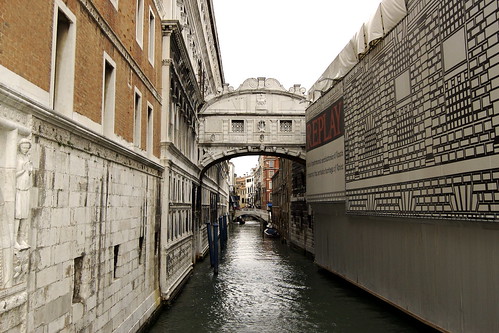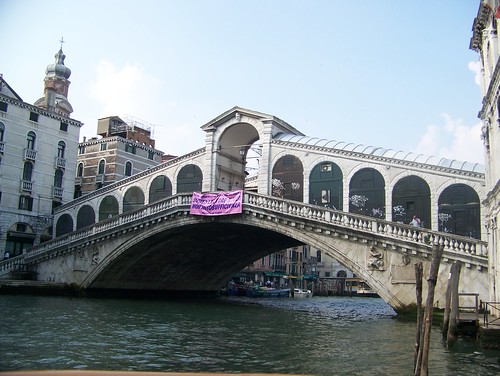From Volume I, Chapter II: "The Throne":
The first sentence of this chapter is long, but it is pertinent to the major themes of the book:
"In the olden days of travelling, now to return no more, in which distance could not be vanquished without toil, but in which that toil was rewarded, partly by the power of deliberate survey of the countries through which the journey lay, and partly by the happiness of the evening hours, when, from the top of the last hill he had surmounted, the traveller beheld the quiet village where he was to rest scattered among the meadows beside its valley stream; or, from the long-hoped-for turn in the dusty perspective of the causeway, saw, for the first time, the towers of some famed city, faint in the rays of sunset;--hours of peaceful and thoughtful pleasure, for which the rush of the arrival in the railway station is perhaps not always, or to all men, an equivalent,--in those days, I say, when there was something more to be anticipated and remembered in the first aspect of each successive halting-place, than a new arrangement of glass roofing and iron girder, there were few moments of which the recollection was more fondly cherished by the traveller, than that which, as I endeavored to describe in the close of the last chapter, brought him within sight of Venice, as his gondola shot into the open lagoon from the canal of Mestre."
I like 1850s-ish modernity of course--it has had time to be formed, packaged, what have you for my romantic imagination. That said, I also agree with the idea that speed and noise and crowds are not optimal conditions for beautiful and profound thinking, at least for certain types of highly sensitive and easily distractable people--obviously plenty of people have been able to thrive, at least artistically, to some degree in the new conditions. Still, lately I have been moving towards the viewpoint that museums, say, at least as they are used by most people, are not optimal settings in which to place good art, unless one is able to go to the museum repeated times, and to devote at least a couple of hours on every occasion to revisiting various works until they really insinuated themselves permanently into one's consciousness. I suspect when the first public museums opened in the late 18th and 19th centuries that it was anticipated that this was how they would work, and probably it is how they do work still for some people.
 In his revisions later in life, Ruskin made many footnotes derogating the silly and foolish sentences he had written as a younger man. I can understand why he did not delete them though; a generally successful work (this does not apply to undisputed world masterpieces, but such works of course are extremely rare) often depends on a certain tone, or attitude, in its thinking, and sometimes to correct the occasional overexuberant or ill-considered thought in the sobriety of older age would be detrimental to the overall effect of the whole.
In his revisions later in life, Ruskin made many footnotes derogating the silly and foolish sentences he had written as a younger man. I can understand why he did not delete them though; a generally successful work (this does not apply to undisputed world masterpieces, but such works of course are extremely rare) often depends on a certain tone, or attitude, in its thinking, and sometimes to correct the occasional overexuberant or ill-considered thought in the sobriety of older age would be detrimental to the overall effect of the whole.It is sometimes difficult for me to remember that Ruskin, and other authors who are like him (such as Proust), are not, despite their psychological problems and flirtations with romanticism, really people like me, but come from extremely wealthy and cultured backgrounds, the pervasive mental atmosphere of which would be something entirely foreign to me. While Ruskin makes it pretty clear in his writings that he thinks the elite owe it to the lower orders to create an aesthetic and spiritual environment for them in which their basic human natures are not degraded any more than they need to be, and even founded some institutions (which can still be seen today) which the intention of uplifting the common people, his intention seems to be to make them more pious men, better craftsmen, and so on, within the intellectual limitations that the mass of men are bound by. This is not an unsensible idea on the whole--its assumptions however are a little too off-puttingly aristocratic for me, since I interpret it as unequivocally excluding people like me from getting the full, the high view, the high education, the intellectually wider sense of life, the idea of which has seduced me, and probably not for the proper reasons. As it turns out I haven't gotten these things anyway, and I lack the simple piety and capacity to work nobly and skillfully at some beneficent task which is every man's proper lot.
"...though the noble landscape of approach to her can now be seen no more, or seen only by a glance, as the engine slackens its rushing on the iron line; and though many of her palaces are for ever defaced, and many in desecrated ruins, there is still so much of magic in her aspect, that the hurried traveller, who must leave her before the wonder of that first aspect has been worn away, may still be led to forget the humility of her origin, and to shut his eyes to the depth of her desolation."
"The impotent feelings of romance, so singularly characteristic of this century, may indeed gild, but never save, the remains of those mightier ages to which they are attached like climbing flowers; and they must be torn away from the magnificent fragments, if we would see them as they stood in their own strength."
 "No prisoner, whose name is worth remembering, ever crossed that "Bridge of Sighs", which is the centre of the Byronic ideal of Venice; no great merchant of Venice ever saw that Rialto under which the traveller now passes with breathless interest: the statue which Byron makes Faliero address as of one of his great ancestors, was erected to a soldier of fortune a hundred and fifty years after Faliero's death..." O.K., I am sobered--a little. I still think there are worse things in the world than revelling in the Byronic ideal of Venice, especially if you have clearly distinguished it in your mind from the actual, or rather the more solidly demonstrable history. The point however is that this ideal is not merely a fiction, but it is vastly inferior in substance to what it obscures, which is its real crime. This I, perhaps more than most, should know better.
"No prisoner, whose name is worth remembering, ever crossed that "Bridge of Sighs", which is the centre of the Byronic ideal of Venice; no great merchant of Venice ever saw that Rialto under which the traveller now passes with breathless interest: the statue which Byron makes Faliero address as of one of his great ancestors, was erected to a soldier of fortune a hundred and fifty years after Faliero's death..." O.K., I am sobered--a little. I still think there are worse things in the world than revelling in the Byronic ideal of Venice, especially if you have clearly distinguished it in your mind from the actual, or rather the more solidly demonstrable history. The point however is that this ideal is not merely a fiction, but it is vastly inferior in substance to what it obscures, which is its real crime. This I, perhaps more than most, should know better.
"The remains of their Venice lie hidden behind the cumbrous masses which were the delight of the nation in its dotage; hidden in many a grass-grown court, and silent pathway, and lightless canal, where the slow waves have sapped their foundations for five hundred years, and must soon prevail over them for ever. It must be our task to glean and gather them forth, and restore out of them some faint image of the lost city; more gorgeous a thousandfold than that which now exists, yet not created in the day-dream of the prince, nor by the ostentation of the noble, but built by iron hands and patient hearts, contending against the adversity of nature and the fury of man..."
I will have to remember that I can't steal pictures from the Gutenberg site.
On the unique and fortuitous circumstances of Venice:
"Had deeper currents divided their islands, hostile navies would again and again have reduced the rising city into servitude; had stronger surges beaten their shores, all the richness and refinement of the Venetian architecture must have been exchanged for the walls and bulwarks of an ordinary seaport. Had there been no tide, as in other parts of the Mediterranean, the narrow canals of the city would have become noisome, and the marsh in which it was built pestiferous. Had the tide only been a foot or eighteen inches higher in its rise, the water-access to the doors of the palaces would have been impossible..."


No comments:
Post a Comment